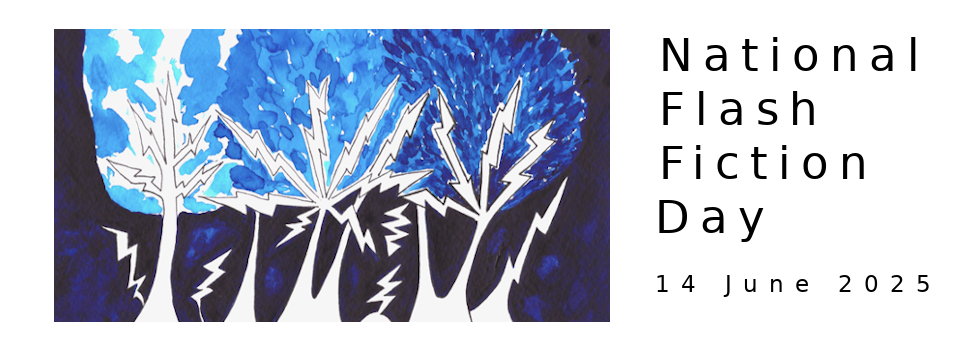Welcome to the fifth in our series of interviews with this year's National Flash Fiction Day Anthology editors and Microfiction Competition judges! This week, Diane Simmons chats with Nod Ghosh, this year's Guest Editor of the 2021 National Flash Fiction Day Anthology, about her most recent collection, the writing of novellas in flash, and the flash fiction scenes in New Zealand and the UK, as well as what she's looking for in the NFFD anthology submission queue....
Diane: I very much enjoyed your novella-in-flash (NiF) The Crazed Wind (Truth Serum Press) and am looking forward to reading Filthy Sucre (Truth Serum Press). Do you have any tips for writers who are considering writing a novella-in-flash?
Nod: Thank you, Diane. I enjoyed writing the stories for The Crazed Wind.
Consider these statements: 'Flash fiction pieces within a novella-in-flash should stand alone without relying on the reader having to read the other of the stories in a series. They could be read in any order and still make sense.'
Are these statements true? Yes and no. In theory, the stories don't rely on anything else in the series. However, without severe paring down, and 'leaving space for the reader's creative response' (as all flash should), there would be unnecessary repetition cluttering a NiF.
As for order, I was taking part in Nancy Stohlman's online course To Get the Words Right in 2018, when I started writing The Crazed Wind. Nancy taught me the importance of placement in a NiF or flash collection. You have to consider the reader's whole experience. Adjacent pieces may be linked through common characters, content or ideas. More importantly, the writer should omit anything that doesn't fit, and create 'fillers' that bridge stories that might otherwise appear disparate.
Stohlman covers this and other topics in Going Short, An Invitation to Flash Fiction.
I can't improve on the advice offered by Michael Loveday in his interview for the Bath Nif Award here: https://bathflashfictionaward.com/2019/07/top-tips-for-writing-a-novella-in-flash-by-michael-loveday-2020-novella-judge/
Loveday states NiF are less successful if the common thread between the stories isn't clear.
The timeline shouldn't be too convoluted to follow.
In another interview, he has emphasised the importance of a cohesive unifying ending.
Diane: Together with Santino Prinzi, you are editing this year’s NFFD anthology on the theme of MAGIC. Is there anything in particular you are looking for from a submission? Or anything that you don’t want to see?
Nod: I aim to select purely on the quality of the writing. Having said that, as the NFFD stories are destined for an anthology, originality would be welcome, so the best stories provide a balanced and entertaining read. However, I wouldn't eliminate a well-constructed piece if its theme were overused. In a way, that might reflect the zeitgeist of 2021.
Here is my message to anyone submitting:
Interpret 'MAGIC' in any way you want.
The only thing I don't want to see is unpolished writing. Learn your craft. Revise your pieces until your brain and fingers hurt. Respond to critique from other writers.
Diane: You currently live in New Zealand, having previously lived in the UK. Both countries have vibrant flash communities and independent National Flash Fiction Days. Can you tell us a little about NFFD in New Zealand and how it came about?
Nod: New Zealand has a rich history of renowned short story writers such as Katherine Mansfield. The shorter form was in evidence too in the last century, for example, Graeme Lay's anthology 100 NZ Short Short Stories (1997).
Michelle Elvy was a pioneer of flash fiction in Aotearoa New Zealand. She started the NZ National Flash Fiction Day competition, and the online journal Flash Frontier, an Adventure in Short Fiction in 2012. Over the years, a large number of writers from all over the country have helped organise events to celebrate placed authors in NZ NFFD. There are regional awards, and the more recently introduced youth and micro (100 word) sections. This year, for obvious reasons the award ceremony was online.
Diane: Have the coronavirus restrictions in New Zealand affected your writing routine at all?
Nod: Back to those 'obvious reasons'! Many events moved to an online format (e.g.: via 'Zoom') after the pandemic restrictions began in Aotearoa at the end of March. A happy side effect of this is that we can now 'attend' overseas functions such as book launches we may not have otherwise been able to. As in other areas, such as work, these adaptations are likely to stay.
On a more personal level, and I think I share this with others, the effects of SARS-CoV-2 have been devastating. We probably all know people who have lost family members to COVID-19. The sequelae of the epidemic will likely be catastrophic both in terms of disease, but also economics on a worldwide scale. That can make it seem futile to write a story.
Currently (late 2020), we are lucky in New Zealand. There is only occasional community transmission of the disease. However it has been hard to focus on frivolous activities such as creative writing, when there is such hardship on a global scale. I felt guilty for being disappointed the launch for Filthy Sucre (Truth Serum Press) was cancelled. Also, it was frustrating seeing opportunities for mainstream publication dry up globally, as publishing houses struggled with the situation.
Ending on a positive note, a semblance of normality here means we can return to our usual practices. I have to thank Nancy Stohlman again for the Flash Nano group online, which has allowed me to make my latest (as yet untitled) Nif. Also, there were some reports that sales of books increased in New Zealand during our lockdown. So while there are difficulties faced by publishing houses, they are still picking work up.
Diane: Do you enjoy performing your flashes? Do you have many opportunities to perform locally?
Nod: I love performing flash fiction, especially the ones where you can get into different characters' heads and do their voices. Last year, there were readings from Best Small Fictions at our central library. The Canterbury Poets Collective features a series of readings each spring, and have often invited flash fiction writers. The recent WORD Christchurch literary festival offered opportunities to read, for example at the launch of The Quick Brown Dog, the journal of my alma mater The Hagley Writers' Institute.
Thank you for the opportunity to answer these interesting questions.

Originally from the U.K., Nod Ghosh lives in Christchurch, New Zealand. The Crazed Wind (novella-in-flash 2018), and Filthy Sucre (three novellas 2020) were published by Truth Serum Press. Details can be found at http://www.nodghosh.com/about/
SUBMISSIONS ARE NOW OPEN for this year's National Flash Fiction Day Anthology and Micro Fiction Competition. Submissions close on 15th February 2021. For more information, please visit our Anthology and Competition guidelines.
